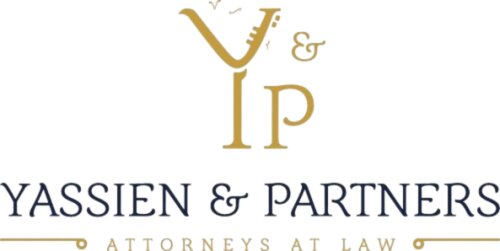Best Structured Finance Lawyers in Agouza
Share your needs with us, get contacted by law firms.
Free. Takes 2 min.
List of the best lawyers in Agouza, Egypt
About Structured Finance Law in Agouza, Egypt
Structured finance covers complex financial transactions that pool or repackage assets, isolate credit risk, and create new financial instruments. In Agouza, Egypt - a district within the Greater Cairo area - structured finance work touches on local commercial centers, banks, non-banking financial institutions and real estate developers operating in the Giza governorate. Legal work in this field typically involves creating special purpose vehicles - SPVs - preparing securitization documentation, negotiating financing agreements, advising on regulatory compliance and managing collateral and security interests for asset-backed or mortgage-backed transactions.
Practitioners advising clients in Agouza must combine knowledge of Egyptian corporate law, capital markets rules, banking and anti-money-laundering requirements, real estate registration practices, tax implications and court or arbitration processes that apply in the Giza judicial district. Local counsel are often needed to handle notarization, registration with government offices and in-person procedures that cannot be done remotely.
Why You May Need a Lawyer
Structured finance transactions are legally and commercially intricate. You may need a lawyer in Agouza if you are:
- A bank or finance company structuring a securitization, covered bond, or other asset-backed financing and you need documentation drafting and regulatory clearance.
- A corporate borrower or sponsor creating an SPV to isolate assets or liabilities and you need corporate governance, shareholders agreements and asset transfer documentation.
- A real estate developer in Agouza packaging mortgage loans or rental receivables for investors and needing property registration, title due diligence and mortgage perfection advice.
- An investor evaluating the legal risks of buying structured products issued by an Egyptian entity, including the enforceability of security and the bankruptcy remoteness of an SPV.
- A creditor or trustee seeking enforcement of security, foreclosure on collateral or recovery through administrative or judicial processes.
- A party negotiating cross-border financing where Egyptian law applies to certain elements and coordination with foreign counsel is required.
- A client needing regulatory clearance or licensing related to capital markets activities, or guidance on compliance with anti-money-laundering and know-your-customer rules.
Local Laws Overview
Several areas of Egyptian law are particularly relevant to structured finance matters in Agouza:
- Companies law and corporate governance - Transactions often require creating or modifying companies and SPVs. The Companies Law governs company formation, share transfers, directors duties and shareholder rights.
- Capital markets and securitization rules - The Capital Market Law and regulations issued by the Egyptian Financial Regulatory Authority - FRA - regulate public offerings, securities, and certain structured products. Securitization and asset transfer rules will determine what documentation and approvals are needed.
- Banking and financial services regulation - The Central Bank of Egypt - CBE - and the FRA supervise banks, non-bank financial institutions and certain market activities. Licensing, lending limits, collateral rules and reserve requirements can affect transaction structures.
- Civil and commercial code provisions - Contract enforceability, obligations, and remedies are governed by Egyptian civil and commercial law principles. Contract drafting must account for mandatory provisions and public policy limits.
- Insolvency and enforcement - Egyptian bankruptcy and insolvency procedures set out creditor remedies, bankruptcy remoteness considerations for SPVs, and how security is treated in insolvency or reorganization.
- Property, mortgage and real estate registration - Perfection of security over real estate requires compliance with local registration and notarization formalities through the real estate registration authorities and notaries public serving Giza and Agouza.
- Tax law - Tax implications for transfers, sales, interest payments, stamp taxes and value added tax must be assessed early. Tax rulings or structuring can affect viability of certain structures.
- Anti-money-laundering and sanctions - KYC, AML and sanctions screening rules apply to parties in structured transactions, and institutions must maintain compliance systems, especially for cross-border flows.
Frequently Asked Questions
What is an SPV and why is it used in structured finance?
An SPV - special purpose vehicle - is a separate legal entity created to hold assets and issue securities. It is used to isolate credit risk from the sponsor, to enable securitization, and to achieve bankruptcy remoteness so that creditors of the sponsor cannot claim the SPV assets if the sponsor becomes insolvent.
Do I need to register asset transfers or security documents locally in Agouza?
Yes. Transfers of real estate or perfection of mortgages and certain securities generally require local registration and notarization with the relevant authorities. In Agouza and Giza you will need to follow the procedures at the local real estate registers and notary offices to ensure enforceability against third parties.
Which regulator oversees securitization and structured products in Egypt?
The Egyptian Financial Regulatory Authority - FRA - oversees capital market activities and certain structured products. The Central Bank of Egypt has regulatory authority over banks and banking products. Which regulator applies depends on the nature of the instrument and the parties involved.
How can bankruptcy law affect a securitization in Agouza?
Bankruptcy law affects whether assets transferred to an SPV are insulated from sponsor insolvency. Proper transfer documentation, true sale analysis and compliance with registration rules are essential to reduce the risk that a bankruptcy trustee could recharacterize the transfer. Local counsel will assess the risk under Egyptian insolvency rules.
What tax considerations should I expect in a structured finance deal?
Tax issues can include stamp duty on documents, corporate tax on income, capital gains tax on asset disposals, VAT where applicable and withholding tax on cross-border payments. Tax treatment can materially affect returns and the pricing of securities, so early tax advice is important.
Can foreign investors use Egyptian courts to enforce rights arising from structured finance transactions?
Yes. Foreign investors can enforce contractual rights in Egyptian courts, subject to Egyptian procedural rules. Arbitration clauses are commonly used to provide an alternative enforcement route. Recognition and enforcement of foreign judgments or arbitral awards must follow Egyptian law and international treaties that Egypt has ratified.
Are English-language documents enforceable in Egypt?
English-language contracts can be used, but Egyptian courts require Arabic translations for proceedings. Notarization and registration authorities may also require Arabic documentation. It is common to prepare parallel Arabic versions and specify which version governs in case of conflict.
What due diligence is usually required before a securitization?
Due diligence typically covers title and registration of assets, validity of contracts underlying the assets, borrower credit analysis, tax reviews, regulatory compliance checks, corporate authority to transfer assets, and any third-party consents required to assign rights. Local searches at registration offices and notaries are often necessary.
How long does it take to perfect security interests over assets in Agouza?
Timing varies by asset type. Real estate registrations and mortgage perfection can take several weeks depending on backlog and the completeness of documentation. Registration of charges over movables or receivables also depends on the relevant registry processing times. Local counsel can provide realistic timelines for each registry.
How should I choose a lawyer for structured finance matters in Agouza?
Look for a lawyer or firm with demonstrable experience in securitization, structured products, banking law and real estate registration in Egypt. Ask about specific transactions they handled, their familiarity with the FRA and CBE requirements, whether they work with tax advisors and foreign counsel, fee structures, and their local presence for in-person filings in Giza and Agouza.
Additional Resources
When seeking legal advice or information for structured finance in Agouza, the following bodies and resources can be helpful to consult or to use as starting points for research:
- Egyptian Financial Regulatory Authority - FRA - for capital markets and non-banking financial regulations.
- Central Bank of Egypt - CBE - for banking and monetary regulations affecting lenders and banks.
- General Authority for Investment and Free Zones - GAFI - for company registration practices and investment-related approvals.
- Egyptian Exchange - EGX - if listing or market distribution of securities is contemplated.
- Egyptian Tax Authority - for rulings and guidance on tax consequences of structured transactions.
- Local notary offices and the Real Estate Publicity/Register departments in Giza for real estate and mortgage registration.
- Giza or Egyptian Bar Association for referrals to local lawyers with experience in structured finance and banking law.
- Ministry of Justice - for information on courts, judicial procedures and enforcement processes.
Next Steps
If you need legal assistance with a structured finance matter in Agouza, consider taking these practical steps:
- Prepare a short brief summarizing the transaction or legal issue, include parties, assets, proposed structure, jurisdictions involved and a timeline.
- Seek a local lawyer with structured finance, banking and real estate experience. Request examples of similar work, client references and a clear fee estimate - fixed fees for discrete tasks and hourly rates for longer engagements.
- Arrange a preliminary meeting - either in person or virtual - to discuss regulatory risks, due diligence needs, tax implications and registration steps specific to Agouza and Giza offices.
- Ask the lawyer to provide a checklist of documents needed for due diligence, registration and notarization, and to explain expected timelines and costs for each stage.
- Consider engaging tax counsel and, if the transaction is cross-border, coordinating with foreign counsel early to align documents and dispute resolution clauses.
- Insist on a written engagement letter setting out scope of work, fee arrangements, confidentiality, conflict checks and dispute resolution for the attorney-client relationship.
- Keep records of all filings, registrations and approvals, and obtain certified copies of registered documents and notarizations for investor and lender files.
Taking these steps will help you manage legal risk and move a structured finance transaction forward with greater predictability while ensuring compliance with local rules and procedures in Agouza, Egypt.
Lawzana helps you find the best lawyers and law firms in Agouza through a curated and pre-screened list of qualified legal professionals. Our platform offers rankings and detailed profiles of attorneys and law firms, allowing you to compare based on practice areas, including Structured Finance, experience, and client feedback.
Each profile includes a description of the firm's areas of practice, client reviews, team members and partners, year of establishment, spoken languages, office locations, contact information, social media presence, and any published articles or resources. Most firms on our platform speak English and are experienced in both local and international legal matters.
Get a quote from top-rated law firms in Agouza, Egypt — quickly, securely, and without unnecessary hassle.
Disclaimer:
The information provided on this page is for general informational purposes only and does not constitute legal advice. While we strive to ensure the accuracy and relevance of the content, legal information may change over time, and interpretations of the law can vary. You should always consult with a qualified legal professional for advice specific to your situation.
We disclaim all liability for actions taken or not taken based on the content of this page. If you believe any information is incorrect or outdated, please contact us, and we will review and update it where appropriate.









